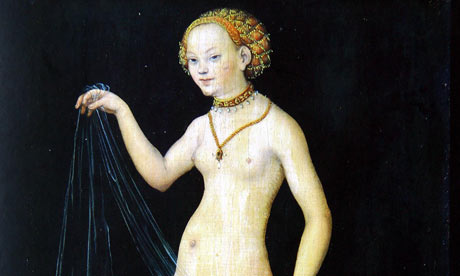
This week's poem, Richard Crashaw's "Wishes to his (Supposed) Mistress", was my first ever "favourite poem". Possibly this had something to do with the endless flow of oddly-named muses, the Altheas and Phyllidas and Lucastas, that passed before my glazing eyes whenever I dipped into my gift copy of Palgrave's Golden Treasury. I loved that anthology, and, although an 11-year-old aspiring "poetess", I wasn't alarmed that women were more often the subjects than the authors (what's so bad about being a rarity?) but, yes, it was refreshing suddenly to be presented with this notion that the poet's desired woman might not exist at all; that she might be a figment of his imagination. It opened a space in my mind, and told me that poems could be shyly self-revealing as well as gloriously rhetorical and assertive.
One of the lesser-known metaphysical poets, Crashaw (c.1612-49) writes with unselfconscious tenderness and charm. His work often fuses the erotic with the maternal, and it may not be irrelevant to note a couple of biographical facts. He lost his natural mother while still a baby. His father, the puritan preacher William Crashaw, remarried, but, before Richard was six years old, his stepmother had died. While still a young man, he rejected his father's religion: after a fellowship in Cambridge (he was a gifted linguist) he fled first to Paris, and then Rome. He died, a Catholic convert, at the Loretto Cathedral of Santa Casa, where Charles I's queen, Henrietta Maria, had secured him a minor post.
Crashaw's poetry certainly notices children. There is humour as well as devotion in his "Hymn to Sainte Theresa", addressed to St Theresa of Avila, who, at six years old, attempted to gain martyrdom by preaching to the Moors: "Farewell all pleasures, sports and joys/ (Never till now esteemed Toyes),/ Farewell whatever deare may bee,/ Mother's arms or father's knee,/ Farewell house and farewell home,/ She's for the Moors and Martyrdome.// Sweet, not so fast!" In "An Hymne to the Nativity, as sung by Shepheards", one of the rustics sings of the infant Jesus: "See, see, how soon his new-bloom'd cheeke/ Twixt mother's brests is gone to bed,/ sweet choice (said I) no way but so/ Not to lye cold, yet sleep in snow." The Petrarchan tradition emerges in the antithesis here of warmth and chill, an inheritance that reached him perhaps via the Italian poet he translated, Giambattista Marino.
"Wishes to his (Supposed) Mistress" is speculative, or discreetly posed as speculative. That is part of its originality; another is its structure. Each of the daintily shaped tercets presents a little drama as it builds from two to four beats, almost a miniature portrait of modestly blossoming hope. The "she" in question is an adult, of course, but it seems likely that the poem has been a model for later male poets expressing their hopes for the future happiness of female children, for instance, Yeats's wonderful "Prayer for my Daughter" or the rather more understated but gently hopeful lyric Larkin wrote for Sally Amis, "Born Yesterday". In both there is the same sense of restraint, of not wishing too much, but valuing simplicity and mildness. Of course, a feminist reading of such poems might see them as patronising, and their idealisation of women as self-servingly limited and stereotypical.
The version below has modernised spelling and is taken from a 1975 edition of Palgrave, omitting several stanzas present in Crashaw's original text. The shortened version was published during the poet's lifetime, so quite possibly had his approval, and I think the tactful editing allows the shape of the poem to emerge with greater effect. However, if you prefer, the full text is available online.
Wishes
To his (Supposed) Mistress
Whoe'er she be,
The not impossible She
That shall command my heart and me;
Where'er she lie,
Locked up from mortal eye
In shady leaves of destiny:
Till that ripe birth
Of studied fate stand forth,
And teach her fair steps tread our earth;
Till that divine
Idea take a shrine
Of crystal flesh, through which to shine:
Meet you her, my wishes,
Bespeak her to my blisses,
And be ye called, my absent kisses.
I wish her beauty
That owes not all its duty
To gaudy tire, or glist'ring shoe-tie:
Something more than
Taffeta or tissue can,
Or rampant feather, or rich fan.
A face that's best
By its own beauty drest,
And can alone commend the rest:
A face made up
Out of no other shop
Than what Nature's white hand set ope.
Sydnaean showers
Of sweet discourse, whose powers
Can crown old Winter's head with flowers.
Whate'er delight
Can make day's forehead bright
Or give down to the wings of night.
Soft silken hours,
Open suns, shady bowers;
'Bove all, nothing within that lowers.
Days, that need borrow
No part of their good morrow
From a fore-spent night of sorrow:
Days, that in spite
Of darkness, by the light
Of a clear mind are day all night.
Life, that dares send
A challenge to his end,
And when it comes, say, 'Welcome, friend.'
I wish her store
Of worth may leave her poor
Of wishes; and I wish – No more.
Now, if time knows
That Her, whose radiant brows
Weave them a Garland of my vows;
Her that dares be
What these lines wish to see:
I seek no further, it is She.
'Tis She, and here
Lo! I unclothe and clear
My wishes' cloudy character.
Such worth as this is
Shall fix my flying wishes,
And determine them to kisses.
Let her full glory,
My fancies, fly before ye;
Be ye my fictions; but her story.

